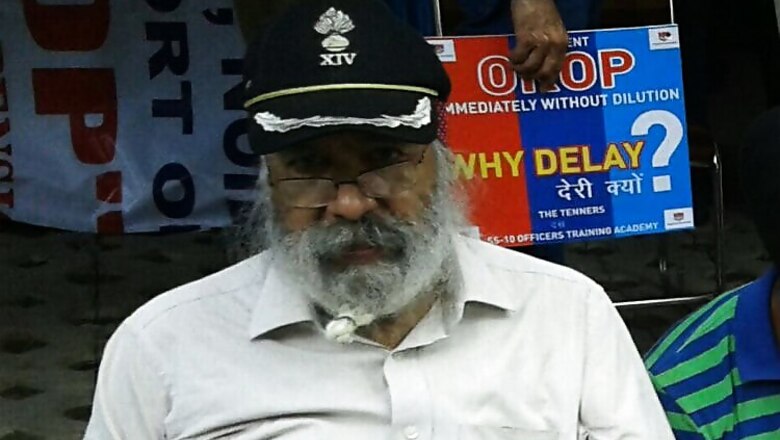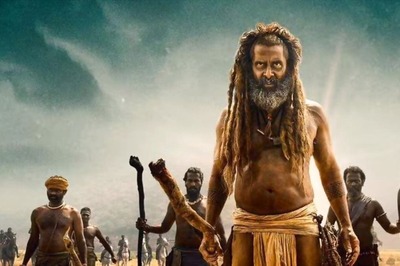
views
The 34-year long fight for One Rank One Pension started by Colonel Inderjit Singh is still continuing with defence veterans out on streets of the national capital demanding their rights.
It was during former prime minister Indira Gandhi's tenure (1966-1977) that major changes were made in the pension scheme of the soldiers and those in the lower ranks of defence forces were affected the most. The Third Pay Commission, which came into effect from November 1, 1973, decided that a soldier from the rank of Sipahi to Subedar Major will get 50% of his salary as pension vis-a-vis 70% that was given earlier but with a condition that he has to complete 33 years in service.
Colonel Inderjit Singh was commissioned into 9 Grenadiers in 1956, served later in 4 Grenadiers and commanded 14 Grenadiers. He retired in 1978 and in 1981 formed an organisation and in February 22, 1982 presented their demands to Indira Gandhi.
In April 1983, Indira Gandhi set a high-level committee and KP Singh Deo, minister of state for defence during Indira Gandhi's tenure, was the chairman of it. "The organisation gave 68 recommendations. In 1984, the report was presented and after two days, Indira Gandhi was shot dead," Colonel Singh said.
When Rajiv Gandhi became the prime minister, out of 68 recommendations presented, 52 were accepted 16 most important recommendations were rejected.
On February 25, 1987, Colonel Singh sat on indefinite fast with his five colleagues. On the fourth day of the fast, the government sent a letter increasing the pension by Rs 150 to Rs 375.
There were five demands - to give pension to widows of pre-1964, restoration of commuted pension, One Rank One Pension, employment upto 58 years, evacuation of land, house of a soldier given on rent to someone when he soldier retires. The first two demands were met and the last one is a state subject.
"On the 16th day of the fast, my health deteriorated and I was admitted to Wellington hospital in Delhi. Then I had meetings with then defence minister VP Singh. After 3-4 days, Singh was removed from the post because of Bofors scam," said Colonel Singh.
When VP Singh became prime minister, he gave very less to the armed forces in ad hoc scheme.
Then came the PV Narasimha Rao government which was a minority government and the opposition got together and said "if you don't accept ad hoc scheme and increase the pension then we will bring down the government'.
"After getting this news, I met the then defence minister Sharad Pawar and he asked to gave in writing all demands. Pawar had a meeting with bureaucrats and he questioned the need for OROP. I just told him that it was needed for survival and then Pawar announced that VP Singh's formula was wrong," said Colonel Singh.
A high-level committee was again formed with five ministers, six MPs, three defence veterans and Sharad Pawar headed it. "The committee gave very good results but bureaucrats ruined it completely. Then an Anomalies Removal Committee was formed and complicated anomalies were to be cleared after Fifth Pay Commission," said Colonel Singh.
The Fifth Pay Commission presented a very strong report and accepted OROP. According to Colonel Singh the bureaucrats again ruined it and reduced it to modified parity for all government employees
Colonel Singh launched protest and on August 22,1997 the IK Gujral government called him immediately. The rally continued for 107 days at Red Fort. 23 chiefs, vice chiefs and Army commanders of all the three forces wrote a letter to the PM stating that it break security environment.
IK Gujral asked the then Defence Secretary to note all the points but bureaucrats did not let the then prime minister see it and then the government fell, said Colonel Singh. The four points were - One Rank One Pension; removal of 33 years in service condition; assured medical facility through medical policy and expenses incurred by the government; double pension for widows of soldiers.
Then came the Atal Bihari Vajpayee government in 1999 and then defence minister George Fernandes had at Anantpur Sahib announced that the government has approved OROP. "When Kargil war was at the peak, the government rejected on file what was approved verbally. In February 2003, a massive rally was organised at Ramlila Ground and we invited former BJP leader ML Khurana who apologised to public and invited me to make a presentation in Parliament," said Colonel Singh.
On April 21, 2003, Colonel Singh made presentation in Parliament. But the report was again rejected by bureaucrats and then the government fell.
In 2004, the Congress formed the government and the Parliamentary Standing Committee Chairman called Colonel Singh. The Chairman then appointed a group of ministers under Pranab Mukherjee and the case was presented to him.
On January 25, 2006, the Committee accepted OROP for JCOs, jawans in full parity with the Fifth Pay Commission. In 2009, the Sixth Pay Commission came and then defence minister AK Antony demanded full parity with the current pay commission and it was accepted in three days.
But some ex-servicemen burnt effigies of Congress president Sonia Gandhi and the party withdrew it.
Even though the Koshiyari Committee gave a strong presentation for OROP in 2011 but Parliament rejected it. The Cabinet Secretary Committee did not accept it either.
In 2014 came the Narendra Modi government with a thumping majority. It presented the strongest ever commitment for OROP but the defence veterans have been hugely disappointed. "The government is not doing anything solid for veterans. It is making a mockery of officers," said Colonel Singh.
The demands are - One Rank One Pension; staffing of soldiers in ex-servicemen department; in Ministry of Defence at each decision level making armed forces men should be there abs separate pay commission for armed forces.
But even after 34 years no obstacle could budge him from his stand and he comes to Jantar Mantar regularly to fight for the rights of veteran.




















Comments
0 comment